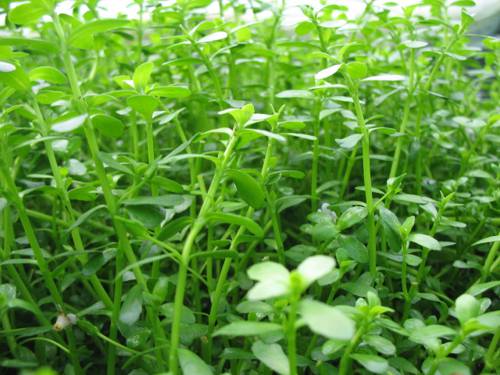
FAQ About Indoor Aquatic Plant Maintenance

What are indoor aquatic plants?
Indoor aquatic plants are plants that live in water-based environments and are maintained inside homes or indoor spaces. These plants can be fully submerged, partially submerged, or floating on the water's surface, making them popular choices for aquariums and water gardens.

Why should I keep aquatic plants indoors?
Keeping aquatic plants indoors offers several benefits. They improve air quality by producing oxygen and absorbing carbon dioxide. Aquatic plants also enhance the aesthetic appeal of indoor spaces, create a calming environment, and support indoor fish habitats by providing shelter and regulating water quality.

What types of aquatic plants can be grown indoors?
There are many types of aquatic plants suitable for indoor cultivation, including floating plants like water lettuce and duckweed, submerged plants like anacharis and hornwort, and rooted plants like Amazon sword and java fern. Each type has its own requirements and benefits.

How much light do indoor aquatic plants require?
The light requirement for indoor aquatic plants varies depending on the species. Most aquatic plants thrive with moderate to high light, typically around 8-12 hours of light per day. LED lights designed for aquariums are often recommended as they provide adequate and energy-efficient lighting.

What is the best way to maintain water quality for indoor aquatic plants?
Maintaining water quality is crucial for healthy aquatic plants. Regularly test water parameters like pH, ammonia, nitrite, and nitrate levels. Use a good quality aquarium filter to keep the water clean and ensure that you change a portion of the water regularly, roughly 10-20% weekly, to prevent the buildup of toxins.

Are there any specific temperature requirements for indoor aquatic plants?
The ideal temperature for indoor aquatic plants generally ranges from 72°F to 78°F (22°C to 25°C). However, this can vary based on the specific plant species. It is important to research the specific requirements of your plants and use an aquarium heater or chiller to maintain consistent temperatures if necessary.

Can indoor aquatic plants survive without a filter?
While some easy-to-care-for plants may survive in unfiltered water, it is generally recommended to use a filtration system. Filters help maintain water quality by removing debris and toxins, which is crucial for plant health and growth. Without filtration, regular water changes become even more important.

What nutrients do indoor aquatic plants need?
Indoor aquatic plants require essential nutrients such as nitrogen, phosphorus, and potassium, along with trace elements like iron and magnesium. These can often be provided through fish waste, but you may also need to add plant fertilizers formulated for aquatic plants to ensure they receive all necessary nutrients.

How do I prevent algae growth in my indoor aquatic plant setup?
Algae growth can be controlled by avoiding overfeeding fish, maintaining stable light periods, regularly cleaning the tank or aquarium, and ensuring efficient filtration. Introduce algae-eating species like snails or certain fish that can help naturally manage algae levels.

Are there any indoor aquatic plants that can help improve water quality?
Yes, many aquatic plants help improve water quality by absorbing nutrients and filtering out impurities. Plants like hornwort, waterweed, and duckweed are known for their rapid, effective nutrient uptake, which can help keep the aquarium environment balanced and clean.

How can I propagate indoor aquatic plants?
Propagation methods vary depending on the plant species. Many aquatic plants can be propagated by cutting and planting a piece of the stem or through root division. Others, like floating plants, might produce offshoots that can be separated and grown independently. Always follow specific instructions for the plant species you have.

What are some common challenges in maintaining indoor aquatic plants?
Common challenges include controlling algae growth, managing water quality, ensuring adequate lighting, and balancing nutrient levels. Each challenge can generally be addressed with proper maintenance practices, careful monitoring, and adjustments to the habitat as needed.

Can indoor aquatic plants co-exist with fish?
Yes, indoor aquatic plants and fish can coexist harmoniously. Plants provide natural filtration, habitat, and oxygen for fish, while fish contribute essential nutrients for plant growth. It's important to choose plant species that are compatible with your fish to prevent damage or grazing.

How do I choose the right substrate for indoor aquatic plants?
The choice of substrate depends on the type of plants you are growing. For rooted plants, a nutrient-rich substrate like aquatic soil or gravel mixed with a fertilizer is suitable. For other types, a simple layer of sand or gravel may suffice. Ensure the substrate is appropriate for the specific needs of your plants.

Can I use tap water for indoor aquatic plants?
You can use tap water for indoor aquatic plants, but it needs to be treated first. Tap water typically contains chlorine and other chemicals harmful to aquatic life. Using a dechlorinating agent or letting the water sit for 24 hours can remove chlorine, making it safe for plants.

What are some signs of unhealthy indoor aquatic plants?
Signs of unhealthy aquatic plants include yellowing leaves, stunted growth, wilting, and excess algae on the plants. These symptoms can indicate poor water quality, inadequate lighting, or insufficient nutrient levels. Identifying the cause allows you to take corrective actions promptly.

Why is proper lighting crucial for indoor aquatic plant health?
Proper lighting is essential for aquatic plant photosynthesis, facilitating growth and oxygen production. Without adequate light, plants can become weak, leading to poor health and an inability to compete with algae. Light quality and duration are both critical considerations.

What are some popular indoor aquatic plant combinations?
Popular combinations include java fern and anubias for low-light setups, or pairing more demanding species like Amazon sword with CO2 supplements. Selecting plants with similar light, temperature, and nutrient needs ensures they thrive together. Consider aesthetics and ecosystem balance in your choices.

Are there any low-maintenance indoor aquatic plants?
Yes, several aquatic plants are known for being easy to care for, such as java moss, anubias, and hornwort. These plants are resilient, requiring less light and fewer nutrients while still contributing significantly to the aquarium ecosystem's health.
